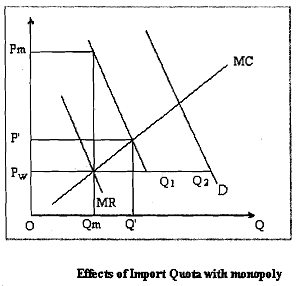Import Quotas with Monopoly:
When there is a domestic monopoly, an import quota leads to greater loss in social welfare, as compared to perfect competition. In fact we will see that in the presence of monopoly, an import tariff should be preferred to a quota from the efficiency and social welfare point of view.
When there is a tariff t, imports are freely available at a price (Pw + t). So the monopolist cannot charge a higher price than this level, for if he did domestic consumers would go for imports and his sales would be reduced to zero. Thus a tariff effectively imposes a price ceiling. However, with a quota, the monopolist can charge a price higher than the import price. In this case he will not lose his entire market share, since imports cannot exceed the limit set by the quota. Thus a quota preserves the monopolist's price setting power to a large extent.

Figure 4.3. Under free trade D is the demand curve facing the monopolist and the domestic price of the good is the world imports to the amount Q1Q2. With the quota the demand curve facing the monopolist shifts inwards by the amount of the quota, at all prices above Pw, because imports have reduced the monopolist's market by Q1Q2.
Post quota imposition, the relevant marginal revenue curve facing the monopolist is NIR, corresponding to the new demand curve.
In this situation the monopolist will maximise profits by producing an output of Qm, at which marginal revenue equals marginal cost. This output will be sold at the price Pm, read off the demand curve. Now (Pm - Pw) is the tariff equivalent of the quota or the quota rent earned by the import license holders.
Note that with perfect competition in the domestic market, the MC curve would have been the supply curve, and the market price would have been P' and output, Q'. Clearly with a monopoly the outcome is more inefficient, compared to perfect competition. The monopoly output is lower (Qm<Q') and price is higher (Pm > P'), leading to greater welfare losses. From this analysis it should be clear to you why tariffs are preferred to quotas, especially when the domestic producer wields monopoly power. In fact GATT negotiations have tried to phase out quantitative restrictions and replace quotas with tariffs.